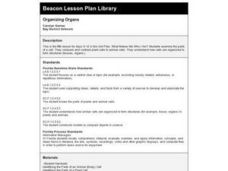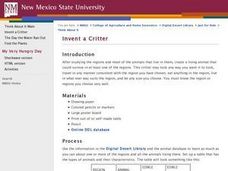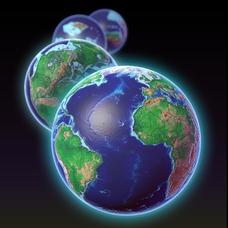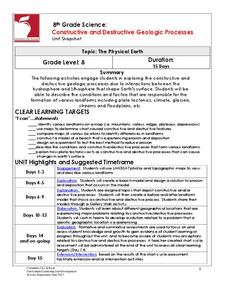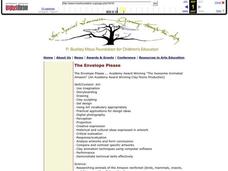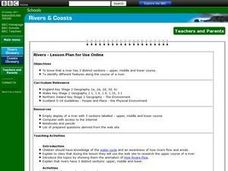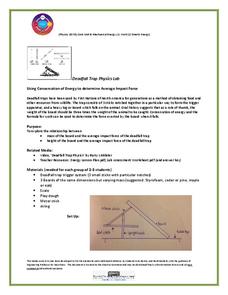Curated OER
Organizing Organs
Fifth graders research plant and animals cells and create a Venn Diagram to show the similarities and differences.
Curated OER
Invent a Critter
Students create a living animal that could survive in at least one specific region and use the digital desert library to gather information. In this invent a critter lesson, students draw a picture of their animal, describe their animal...
Curated OER
ANIMALS OF ANTARCTICA
Students are introduced to the animals of Antarctica and how they adapt to their environment and the changes of the seasons after being read the story,"Counting Penguins" . They pick an animal and predict how he/she thinks this animal...
Curated OER
Marshland Ecosystem
Students classify animals based on their physical characteristics and eating habits. In this animal identification lesson plan, students investigate the life forms shown on a Parisian ceramic basin, and discover ecosystem the artist was...
American Chemical Society
Changing State: Melting
Dry ice is extremely cold — it is -109.3°F or -78.5°C. Scholars observe and explain the molecular motion associated with melting. Then they design their own experiments to speed up the melting process. Finally, a teacher presents a...
Curated OER
How Islands Form
Students how islands form, rising water levels, growth of coral, and volcanoes. They complete Island Investigation worksheets after researching island formation on various Internet websites.
Curated OER
Animal Science as Agriculture
The methods by which farming and agriculture became a valid area of study and research are detailed in this PowerPoint. Also presented are the steps involved for improving productivity and efficiency. The use of scientific method and...
New York State Department of Environmental Conservation
Adaptations – Designs for Survival
What's the difference between behavioral adaptations and physical adaptations? Learn about the various ways that organisms adapt to their environment with a worksheet about the creatures of the Hudson River.
Curated OER
Happy Habitats
Students explore different habitats. In this habitat activity, students investigate four different habitats through participating in a WebQuest. Students create an animal web using Kidspiration or a video documentary upon completing the...
Curated OER
Cloud in the Classroom
Students describe the relationship between animals and humans. In this biology lesson, students research about the history of horses in America. They present a mock news broadcast about their research.
Howard Hughes Medical Institute
EarthViewer
Can you imagine Washington DC and London as close neighbors occupying the same continent? Learners will be fascinated as they step back in time and discover the evolution of the earth's continents and oceans from 4.5 billion years ago to...
Curated OER
Open-Ended Questions
Students identify a topic for an open-ended question and evaluate the question. After developing ideas that lead to inquire, they investigate and research this topic on the Internet, and then create an iMovie.
National Wildlife Federation
Citizen Science to the Rescue!
You don't have to be a scientist or even out of high school to contribute to scientific research. In the 12th lesson in the series of 21, scholars use this opportunity to add to the growing body of scientific knowledge and consider the...
Columbus City Schools
Constructive and Destructive Geologic Processes
Show the class the world as they've never seen it before—from way above! Learners try to unravel the mysteries presented by rich satellite imagery, learn to interpret topographic maps, and study erosion by constructing their very own...
Channel Islands Film
Island Rotation: Lesson Plan 1
How do scientists provide evidence to support the theories they put forth? What clues do they put together to create these theories? After watching West of the West's documentary Island Rotation class members engage in a series of...
Curated OER
What Do We Learn From Fossils?
Students investigate what a fossil is and how it came to be. For this fossil lesson, students examine pictures of skeletons and identify characteristics that can and cannot be determined by a fossil. Students complete diagrams of a...
Curated OER
The Envelope Please
Students research an animal of the rainforest. They create a computerized claymation to present their research.
Curated OER
Animals of the Arctic
Sixth graders research an Arctic animal. They survey the questions in the Animal Report in order to conduct their research. They investigate their chosen animal by using the Internet, library books and reference books.
BBC
Rivers - Lesson Plan for Use Online
Here is a very nice lesson on rivers and the water cycle designed for young learners. In it, pupils view two animated cartoons that do a terrific job of showing how the water cycle works, and how rivers flow. After that, everyone answers...
Curated OER
The Animals Kingdom
Young scholars are introduced to the classification system of animals. In groups, they set up an aquarium in which they must maintain throughout the year. They also observe earthworms and how they react to various stimuli and research...
University of Saskatchewan
Using Conservation of Energy to Determine Average Impact Force
Explore the center of gravity with your science class as they create a deadfall trap with common materials. They research the concepts of energy conservation and gravitational force before dividing into small groups to create a model of...
NOAA
It's a Roughy Life
Scientists recently discovered several previously unknown species at the Bear Seamount off the coast of New England. Scholars research these new species — benthopelagic, benthic, and seamount fish — and find out what makes them unique....
Curated OER
Bug's Eye View
Investigate the life of bugs and how they interact with the environment in this integrated science and language arts lesson. Young scientists construct mini environments in cages in order to make observations. This data forms the basis...
Cold Spring Harbor Laboratory
The RNA Message Is Sometimes Edited
In 1993, Phillip Sharp and Richard Roberts won the Nobel Prize for their discovery of split gene theory. Learn about the breakthrough with the help of an online interactive. Hear both scientists explain it in their own words, watch an...


